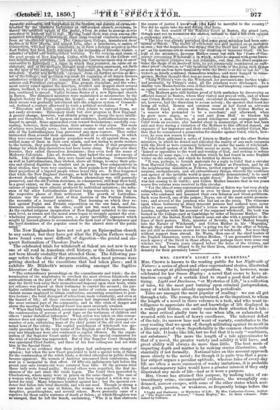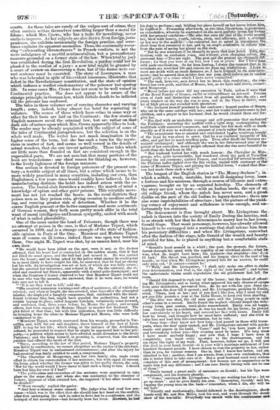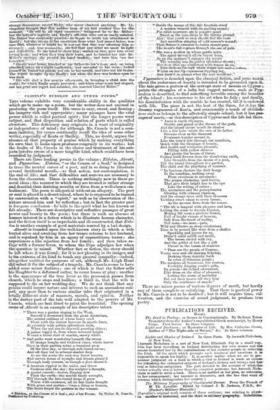MRS. CROWE'S LIGHT AND DARKNESS.*
Has. thrown is known to the reading public for her Night-side of Nature; a series of ghost and other supernatural stories, illustrated by an attempt st philosophieal exposition. She is, however, more celebrated for her Susan Hopley a navel that seems to have at- traction enough of a • certain- kind to stand a good deal of adver- tising. Light and Darkness, ' "or Mysteries of Life," is a collection of tales, for the most part turning upon criminal jurisprudence, many of which have already appeared in periodicals. Tales are amongst the most popular of reading: we can all get through a tale. The young, the untrained, or the impatient, to whom the length of a novel in three volumes is a task, and who want in- telligence to appreciate the art and knowledge of life displayed in a really good fiction can easily sustain then attention for a tale : the most critical gladly turn to one- when idle, or exhausted, or wearied with too much of heavy excellence. The inherent defect of the tale, its narrow base and want of variety, contributes to the easy reading that we speak of, though militating against its merit in a literary point of view. Superficiality is the common characteristic of the tale. It looks like life, but we feel that it is only "semblance, not substance." The more the length of a tale approximates to that of a novel, the greater variety and solidity it will have, and great ability will always do more than little. The best mode of imparting depth and matter is by making stories illustrative, sub stantially if not formally. National tales on this account approach more closely to the novel ; for though it is quite true that a pecu- liar subject argues a peculiar aptitude, whereas tales of every-day life are often a were succession of washy imitations, it is probable that contemporary tales would have a greater interest if they only illustrated any mode of life—had as it were a purNse. Mrs. Crowe has attained this purpose, by making tales of traordinary crime, circumstantial, evidence, the wrongfully con- demned, narrow escapes, with some of the other states which acci- dent, guilt, passion, or weakness, so frequently brings before the • Light and Darkness; or Mysteries of Life. By Mrs. Catherine Crowe, Author of " The Night-side of Nature," " Susan Hopley," Sm. In three volumes. Pub- lished by Colburn. courts. As.these tales are rarely of the vulgar sort of arime{ they often contain within themselves- something larger than a moral for felons ; which Mrs. Crowe, who has a taste for moralizing, never omits to improve. As her subjects are alSo drawn from foreign juris- prudence, she exhibits incidentally the foreign practice, and some- times explains its apparent anomalies: Thus-, the oontinuallyaecur- ring " extenuating-circumstances' in' French verdicts; is vitt the mere. indulgence of a_morbid sentimentalism, but. a precautionary measure grounded. on a former state of the law. When:trial by jury. was established during the first Revolution, a pardon coulilinot be pleaded to the verdict of a jury : a new trial might be granted by a court of review on discovering a flaw, but if the ferias- were cor- rect sentence must be executed. The story of Lesurques; it man who was beheaded in spite of his evident innocence, illustrates that deb& in the Revolutionary constitution, and the state-of opinion' which induces a verdict condemnatory of the prisoner but, sparing' 1M-. In some cases!Frs. Crowe does -notseenr to be well versed in Continental practice. She does- not appear to be aware of. the strange principle. in German raw, which forbids-death to be inflicted till the prisoner has confessed. The tales in these volumes are of varyinn.° character and-varying: length ; some, indeed, being almost too brief for reprinting in volumes. The scenes of those which have crime in some way or other for their basis are Tail on the Continent ; the few stories of Frigiish manners avoid the- criminal law,. but are rather -on that. dark side ofnature upon which Mrs. Crowe apparently-likes to look. The reader-may be aarly acquainted with the subject of some of the tales of Continental jurisprudence, but the selection is on the whole well made. The writer has not much imagination in the higher sense of the term, but she has such a turn for the myste- rious- in matter of fact, and:seems so well versed' in. the details of actual wonders-' that she can invent naturally. Those tales which are little more than founded on fact are consistent enough in the superadded parts. We are not sure but. that many portions-of the book are translations-: our chief reason for thinking so, however, lathe lively-lightness of the foreign manners. One section is devoted- to foreign poisoners-of the present cen- tury; a terrible subject at all times,, but a crime which seems to be more widely practised in many countries, inolnding our. own, than Iloglishmen- a few years sincewould.readily have believe& In. the manufacturing districts the habit has. indeed, arisen with the oc- casion. The burial-club furnishes a motive ; the march of mind a knowledge of opiiun and other quietpoisons. This scientific move- ment has not. yet reached: the. boors.: in. the rural districts they poison men, as they poison rats,, giving occasion to needless suffer,- mg, and running: greater risk of detection. Whether it be the coarse English peasant or the better-mannered, and more sentiment- al; German woman, they both seem pretty-much- alike in the total. want of moral intelligence antlImman sympathy, united withmneb of what is- called plausibility. One of the cases under the head. of Poisoners, though there was, no .attempt at- poison in the case, is that of Madame. Tiquet, which. occurred' in 1899, and is a- strange example of the state-of fashion- able opinion in Paris at the tune.. Monsieur and-Ii aiirtme Tiquet were of course on.. ill terms.;, indeed there. was open. war between. them. One night.M.Tiquet was. shot,.hy andinseenhand, near his- own. door.
"Ile would have' been killed on the spot, were it net, as the cloches- affirmed, that his heart had so contracted on the sudden alertly, that it had- not filled its usual space, and the ball-had- just- missed it. He was carried into the house and. on. being asked by the police what.enemy he. could point to as most likely to have sought his ha answered. that he had-no enemy but his wife. An investigation was set on foot, of which she was fully aware ; bat- she asserted her innocence, and refused to fly. On'the contrary, she vi- sited and received her friends, apparently- with- a-mind quite disengaged ; and' when the Countess d'Aunoy observed to her that Monsieur Tiquet could not be sure who was-the assassin,. she answered, that.. if he were sure, he-would take care not to -tell it " 'It is me they want to kill,' said she. 13he received numerous warnings and offers of assistance, all of which she rejected; and when at length. she was arrested, nine- days after the attempted': murder, she displayed a haughty composure, that, combined with the' insuf- Stunt evidence they, had, might have puzzled the authorities, had, not a certain laquais de, place, called Auguste: Catelain, voluntarily, come forwar4., and confessed, that, three years before, he, Moura the porter, and-several others, had been engaged by Madame Tiquet to murder her husband. The plot failed at that time; but with this indication, there was little difficulty ue brinrng home the orime:to Madame TEquetand Mourn, who were. both. condemned to die.
" Monsieur_ 'Piquet, scarcely recovered from his wounds, proceeded to Ver. sines, and, with his son and daughter, threw himself at the feet of Louis NTV. to beg for her life; which being at the instance of the Archbishop, refused, he proceeded to request. that he might be appointed heir-to -bee pro- perty,—a petition which Walla to haveatforded.much.diversion. to the lively Parisians; and the King himself, in granting it, observed, that the. second. petition hadeffaced the merit of the first. "Sinee, according to the law of that period, Madame Tikuet's- property was liable to confiscation, we cannot altogether see the justice oftboatricture. Monsieur Tiquet was in embarrassed circumstances; and after the injury he had received' was fairly entitled to such a compensation.. "The Chevalier de Mongeorge, and her own family also, made every effort to obtain the commutation of her sentence; but with.equal ill success. On being asked whether the former was privy to herguilty intent, she said, 'Wet' for the world would I have dared to hint such athing to him. I should. hope-lost hinefor ever if I had!'
"The publication andtexecution.of the sentence were appointed to take place on the seine, day; and when. she-. was conducted. to the chamber of torture, ignorant of what awaited her she inquired `if her affair. would soon be-decided ?'
"'Soon enough,' replied the gaoler. "And here's strange scene enenedi The judge: who- had read her sen- tenee—which was to the effect that she shouLd lose her head on tha scaffold, after first undergoing the rack in-order to force her to. a,00nfesaion and- the betrayal of her accomplices—had formerly been her lover. Howbeit, belied'
---
ferent ; for then you were at my feet, now am at yours. But with herpresent condition= She whowes owe the idol of the world around her blest with beauty, youth, talentaceati14. and affluence, now a criminal on hen way to the scaffold! '—he.eutrWited her ,to spend reecutsuce the short time that remained to her, =4 trpin, aiqpict-swhfe:ssion to reliev# from the pain of seeing her placed on the rat*. .„ tionlessj with an unshaken voi without, mem,c4angMg-,,F4 his d tolperfoeminand; bidding her eeze,lientelf on hez.knew before him,
he fu1611ed Proceeding afterwards, as was then, the onstom, to pronounce an exhortation, wherein. he contrasted in. the most pathetic terms her former
answered han,4. Tom are 10.141 " But le:was mistaken if he thought to move th44zen hea:t 414,, with =dr recollections. ' So ler from fearing,- ITdepur.; 111)9 ?Re t terminate my wretched life ,and, release me trope, I I 111 t o meet.my -death with as ineell.froultasSiAls,:l lotvlb 1 CR gl* meat and be assured. that neitherifeat, UPC pun,
myself guilty of a crime which I have never cern=
The rack, however, Floowforced her, to, break,. thia..recolutimi Oaf ,Pun'. fessed her own .guilt, and that af Mount, but, as we have said above, exoner- ated Mongeorge. " Never before nor since did any execution in Paris, unless it were-that of the Royal Family of France, excite so extraordinary an interest Persona even of rank- and distinction rushed from all quarters into the city ; and every window on the way she was to pass, and in the Place de Greve, were let at high prices and crowded with spectators.- " She declared herself .penitent to her confessor ; begged pardon of Mount, who sat-in-the same carriage with her ;.sent her tender remembrances to her children, and a prayer to her husband that he would, cherish them and for- give her. " She died with an unshaken courage and self-possession- that enchanted" the Parisians; mounting the scaffold with a light step; contemplating the multitude with unmoved composure, and baring- her fair neck with as much alacrity as if it were to welcome- a carcanet of jewels rather than tin axe. "The executioner-was so amazed and.confounded byothe wondrous beauty- of the head he was about to sever, that he was rendered incapable of his. office, and put her to much needless pain. Even after (had" the-features re-, mained unchanged; and although- she-was in her forty-second year-at the period of her-execution many people affirmed that she was ,more betintifulirc death-thairshe had-keit in life. " Her husband buried her with much honour : the Chevalier de Mon- george, who quite inconsolable, had wandered about the park at 'Versailles during the sad ceremony, quitted France, and travelled forseverarmonthe;- the Parisian ladies-sighed overthe fair victim, 'smiled with contempt at the: name of Monsieur Tiquet, and pitying the faithfullover, I wished-that Hea- ven had -made them- such a. man.' " The longest, of the English stories.ia "-The. Money-Seekers " • in., which. a -selfish, weak, unstable, but notill-designing lover, foam a fortune and his, mistress, throughneourse ofidlenees, and extras- vaganee, brought' on by an expected heirship The elements of the story are not. very new,—with an Indian: uncle, the son of- an old college friend,, whom- the nabob. has. never seen, and a. great. dislike on the part of the old, legacy-hunters :. there are, also some improbabilities.of structure ; but the pietureof the yield- ing votary• of enjoyment and selfishness• is. true enough, and un- fortunately too common. The denouement is thus brought Ain't. Mr. Livingst,one the.. nabob -is. thrown- into the society of Rrnily Dering.thelmoine, and. is sostruek- with her that he- determinesto marry her-toker lover,., Gerald Gage. That weak personage, however; hasalreadv- allowed! himself to be entrapped into a marriage that shall release 'him from his pecuniary-difficulties ' • and- when Mr: Livingstone, somewhat after-the fashion of. the stage, tells Gerald of the wealth and- beauty provided for him, he is placed in anything hnt.rt- comfortable state of mind. " derald's head seemed hr a- whirl ; the past, the- present, the future, darted, through his -mind with the rapidity of an electricaLshock—what hie was,, what he. might have been; his madness—his stupidity—Ids d—d. ill. luck.' His, throat was parched, and his tongue chive to the roof of his. mouth ; so that when Mr. Livingstone pressed him for an answer, he could only gasp out, It cannot—cannot be.' Well,' said Mt. Livingstone, I shall only make one eflbrt to shake- your determination and that is, the sight of the lady herself' • and before! the unfortunate victim could expostulate the old gentleman lied. left the room.
" Gerald felt disposed to rush out of the house ; but the dread-of °drench- ing Mr. Livingstone, and so losing what appeared his only chance:of escape, from utter destitution, prevented him. So- he wit with. his eyes- fixed va- cantly WWII the door- till it opened;. and Mr. Livingstone, pushing m cried, "rhere„ look at her; and. if you don't like her, why I must try and get, you.fifty pounds a year at the India House, to keep you from starving: " The door was shut, the old man gone, and the young people in each other's arms in a second. Emily forgot the neglect—Geraldforgot the wife: young loves, pest scenes, were.adone remembered. Emily was, all happi ness. Gerald was in, adelirium ;.it. was, too much. for. his brain,. he pressed her convulsively to his heart, and covered her face with kisses. Emily felt how he loved, and. thought how he musthave suffered; and- she tried to calm him and lead him into conversation, but in vain. " Some time—they knew- not how long—had passed in these wild tranre ports, when. the door-again opened, and Mr. Livingstone entered with parch-- meats and papers in his hand. Come!' said he, 'you have years of love. and lovemaking before you--this evening. must' be mine. It's. long since, I have made anybody happy ; and now that. I hope I have done it. completely, you must come up-stairs to the drawingroom and let. me enjoy the. sight of my work. Fiat, t however, before we go, will put, this deed in your hand, Gerald—it is your wife's marriage settlement of two hundred thousand pounds. I have chosen to vest the property in her, rather than in you for various reasons. One is, that, I know her bettor, and am attached to her • another, that I am aware, from your own confessions, that she is better fitted to take care of it. But a good husband need very seldom. complain of this sort of arrangement : few women are so ungenerous as to make him feel any difference ; and I am sure Emily- Deringwill not be one+ of them!," "Emily turned a.sweet smile of assurance on Gerald ; but his lips were- compressed, and his features ghastly. " Come,' continued' Mr. Livingstone, 'they are wartang-teaforus ; let ns, go up-stairs' : andhe gave Emily his arm. 'Remember,. Gerald,' said tapping the young man. on the back—' remember, when I die, she will be. my heir.' `Silently and mechanically, Gerald followed to the drawingroom, shook hands with Mr. and Mrs. Miller, took his seat, and went through the dumb- show of the- tea.table. Everybody was struck with hits countenannie Nadi strange demeanour, except Nicky, who never observed anything, Mr. LIL ringstone 'thought that- this sudden- heap of joy had crashed him for moment. 'Ile will be all right tomorrow,'' whispered he to Mr. Miltentr but the kivryer's sagacity and Emily's silbr on ware net lap easily satisfledt •was dead. ,) I t11,..t■ 1., ill ../1,1 I r;
1
“Rie.. nit ;- died e fen-menthe efteetteede, in bringing child into the .7'w/ration. iotuidod upon the classical fietion, and some "aura world i.fOrwhich Emily amply provided; and Vrhen some years had elapsed, about the endurance of beauty, is intended to be grounded upomik., and her grief and regret had subsided, she married Charlie.- Miller." .. ,-dir Prated his hand tenderly, 'and bade him esee :bee ,,,,i, , f, Welt
The re ' NOW'




























 Previous page
Previous page